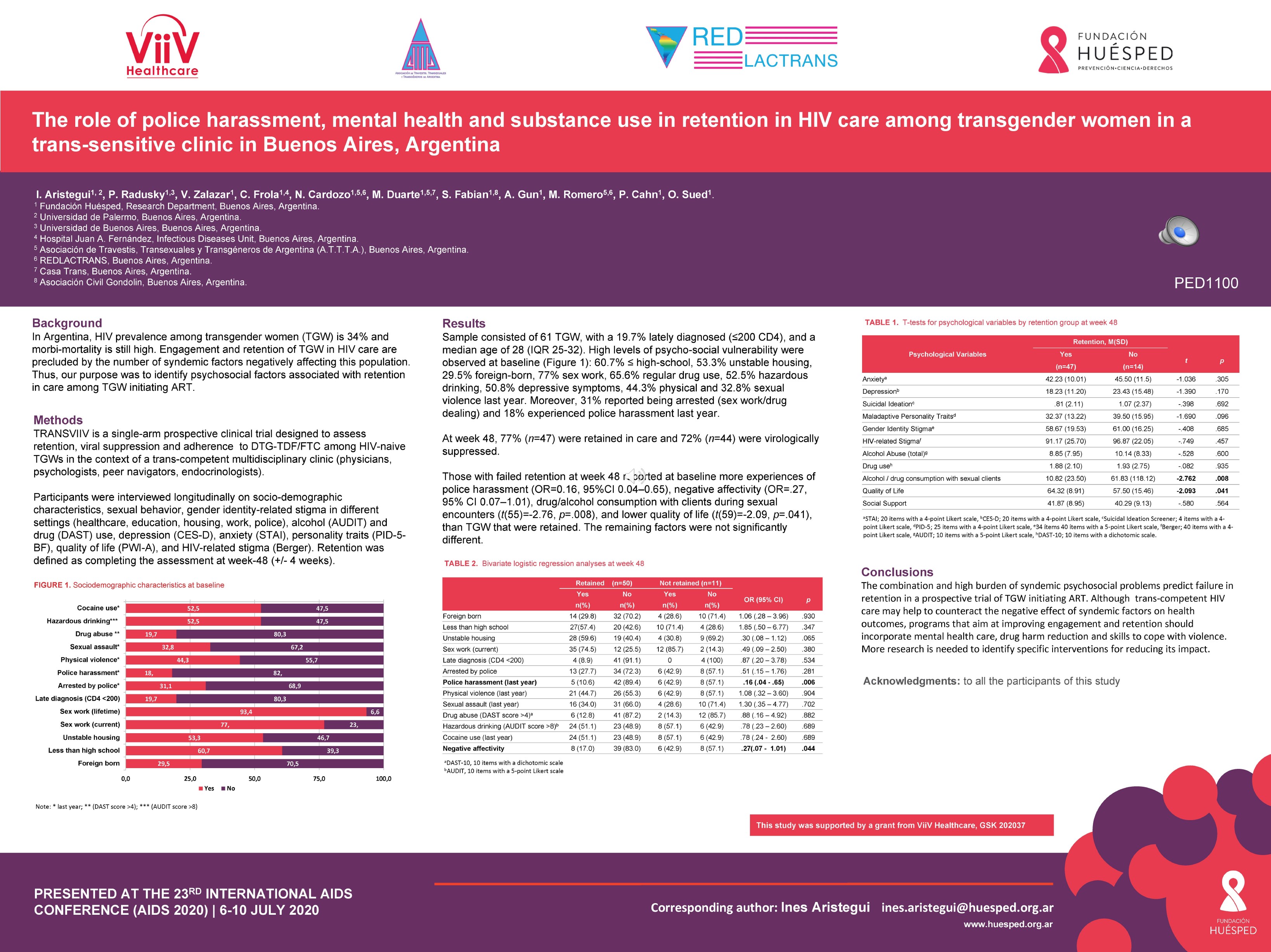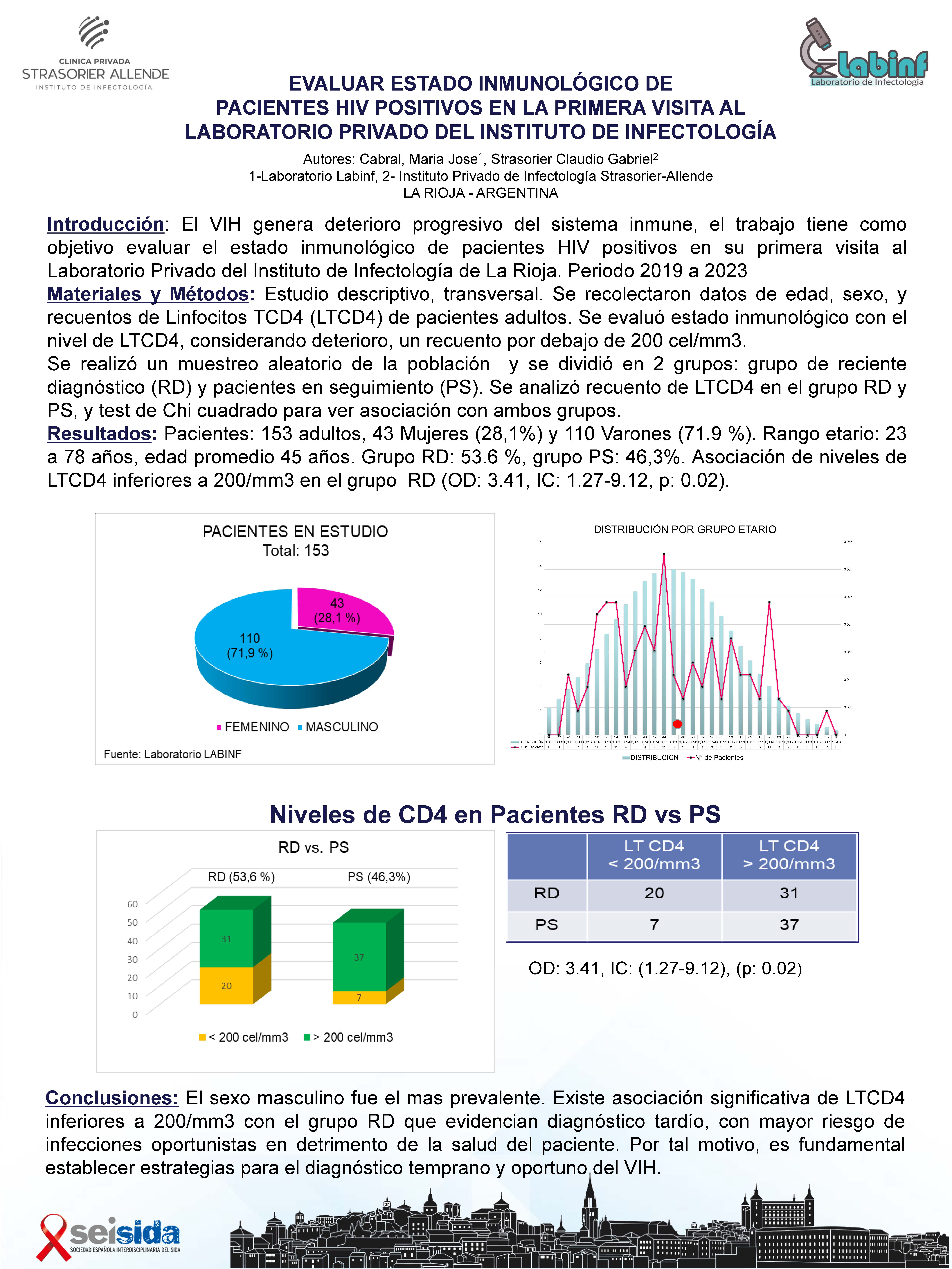Catálogo general VIH

The role of police harassment, mental health and substance use in retention in HIV care among transgender women in a trans-sensitive clinic in Buenos Aires, Argentina
Resumen
BACKGROUND: In Argentina, HIV prevalence among transgender women (TGW) is 34% and morbi-mortality is still high. Engagement and retention of TGW in HIV care are precluded by the number of syndemic factors negatively affecting this population. Thus, our purpose was to identify psychosocial factors associated with retention in care among TGW initiating ART. METHODS: TRANSVIIV is a single-arm prospective clinical trial designed to assess retention, viral suppression and adherence to DTG-TDF/FTC among HIV-naive TGWs in the context of a trans-competent multidisciplinary clinic (physicians, psychologists, peer navigators, endocrinologists). Participants were interviewed longitudinally on socio-demographic characteristics, sexual behavior, gender identity-related stigma in different settings (healthcare, education, housing, work, police), alcohol (AUDIT) and drug (DAST) use, depression (CES-D), anxiety (STAI), personality traits (PID-5-BF), quality of life (PWI-A), and HIV-related stigma (Berger). Retention was defined as completing the assessment at week-48 (+/- 4 weeks). RESULTS: 61 TGW were enrolled, 19.7% lately diagnosed ('¤200 CD4), median age 28 (IQR 25-32). High levels of psycho-social vulnerability were observed at baseline: 60.7% '¤ high-school, 53.3% unstable housing, 29.5% foreign-born, 77% sex work, 65.6% regular drug use, 52.5% hazardous drinking, 50.8% depressive symptoms, 44.3% physical and 32.8% sexual violence last year. Moreover, 31% reported being arrested (sex work/drug dealing) and 18% experienced police harassment last year. At week 48, 77% (n=47) were retained in care and 72% (n=44) were virologically suppressed. Those with failed retention at week 48 reported at baseline more experiences of police harassment (OR=0.16, 95%CI 0.04'0.65), negative affectivity (OR=.27, 95% CI 0.07'1.01) drug/alcohol consumption with clients during sexual encounters (t(55)=-2.76, p=.008), and lower quality of life (t(59)=-2.09, p=.041), than TGW that were retained. The remaining factors were not significantly different. CONCLUSIONS: The combination and high burden of syndemic psychosocial problems predict failure in retention in a prospective trial of TGW initiating ART. Although trans-competent HIV care may help to counteract the negative effect of syndemic factors on health outcomes, programs that aim at improving engagement and retention should incorporate mental health care, drug harm reduction and skills to cope with violence. More research is needed to identify specific interventions for reducing its impact.
Autoría:
ARISTEGUI, Inés; RADUSKY, Pablo David; ZALAZAR, Virginia; FROLA, Claudia E.; CARDOZO, Nadir F.; DUARTE, Mariana; FABIÁN, Solange; GUN, Ana; ROMERO, Marcela; CAHN, Pedro; SUED, Omar
Autoría institucional: ATTTA (Asociación de Travestis, Transexuales y Transgéneros de Argentina); REDLACTRANS (Red Latinoamericana y de Caribe de Personas Trans); Fundación Huésped (Argentina)
Autoría institucional: ATTTA (Asociación de Travestis, Transexuales y Transgéneros de Argentina); REDLACTRANS (Red Latinoamericana y de Caribe de Personas Trans); Fundación Huésped (Argentina)
Ficha bibliográfica
- Año de publicación:
- 2020
- Descripción física:
- [1] p.
- Formato:
- Folleto
- Tipo de documento:
- Coloquios y ponencias
- Notas:
- Póster presentado en la 23rd International AIDS Conference, celebrada de manera virtual del 6 al 10 de julio de 2020.
Contenidos relacionados
También te pueden interesar
-
Sexual behaviors and STI risk in transgender men and non-binary identities from the TransCITAR cohort in Argentina
-
Strategy for the re-engagement of people with HIV (PLwHIV) being treated in public institutions in Buenos Aires City (CABA), Argentina
-
Evaluar estado inmunológico de pacientes HIV positivos en la primera visita al laboratorio privado del instituto de infectología





